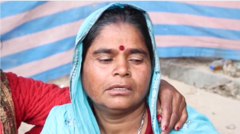A 20-day-old baby girl who was found buried alive in the northern Indian state of Uttar Pradesh is fighting for survival, hospital authorities say.
She was found by chance when a shepherd, who had taken his goats to the area for grazing, heard faint cries coming from under a mound of earth.
Once he went closer, he saw a tiny hand sticking out of the mud. After he alerted the villagers, police were called in who came and dug out the baby.
Police have not disclosed any suspects for the act, but similar cases are typically attributed to India's cultural preference for sons, which has contributed to its skewed gender ratio.
The incident occurred in Shahjahanpur district. The baby is currently being treated in the neonatal intensive care unit of the government-run medical college and hospital there.
According to Dr. Rajesh Kumar, the medical college principal, the infant was brought in smeared in dirt, gasping for air with mud clogging her mouth and nostrils.
She was in a critical condition, showing signs of hypoxia and had been bitten by insects and possibly some animals, he stated.
After 24 hours, there was minor improvement, but her condition later deteriorated due to infection.
Dr. Kumar believed she might have been buried shortly before her rescue given the freshness of her injuries.
A team of doctors is working on managing her infection, but they warn that the prognosis is grave.
As of now, efforts to trace her parents have been unsuccessful, leading to involvement from the state’s child helpline.
This case is not isolated; India has a troubling history of female infanticide. In 2019, a similar case involving a premature newborn dug out from a clay pot made headlines.
The nation contends with a significant gender imbalance, deeply rooted in societal norms that view female children as a financial burden.
Advocates highlight that both sex-selective abortions and infanticide are consequences of this longstanding cultural preference for male heirs.



















